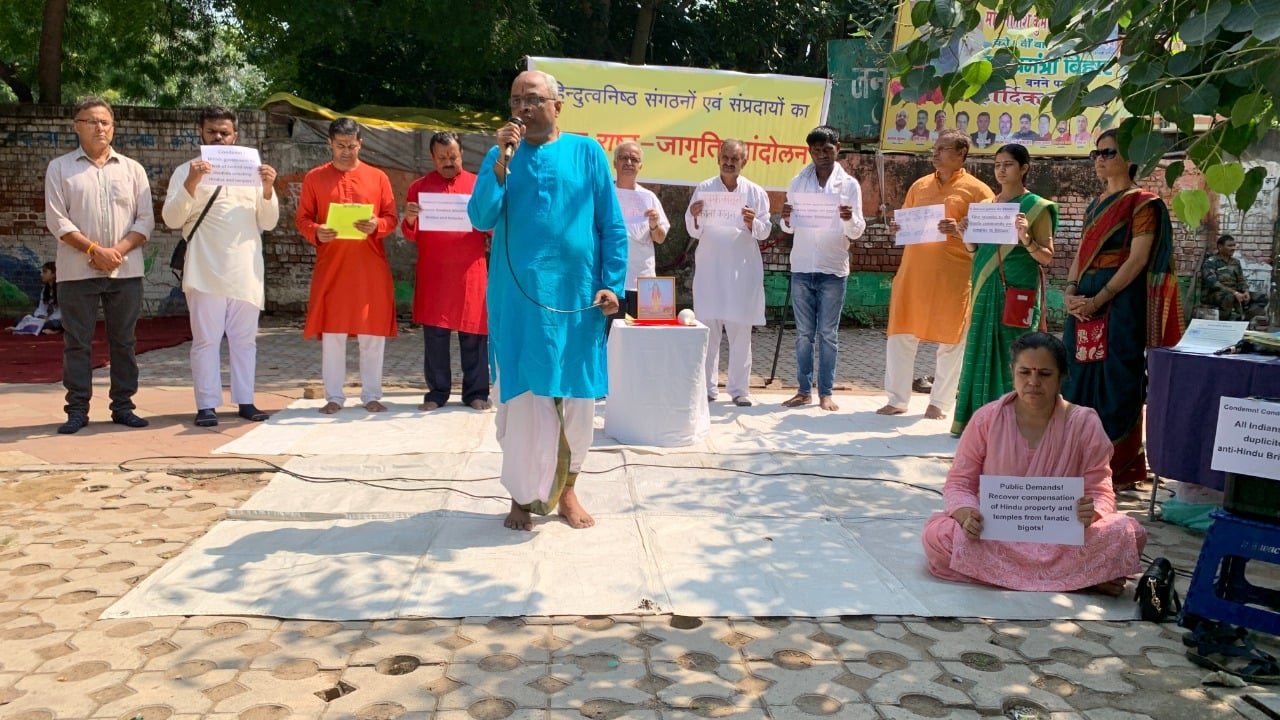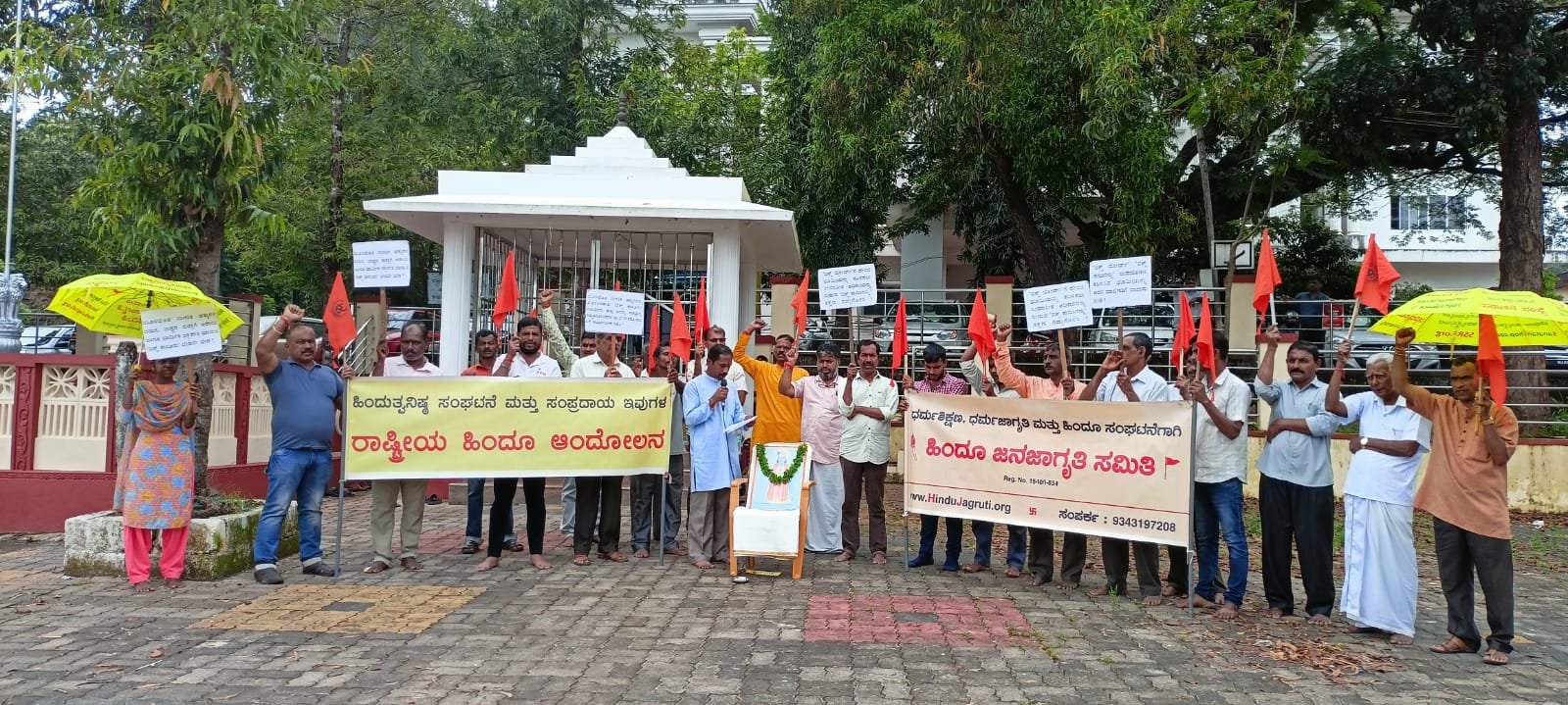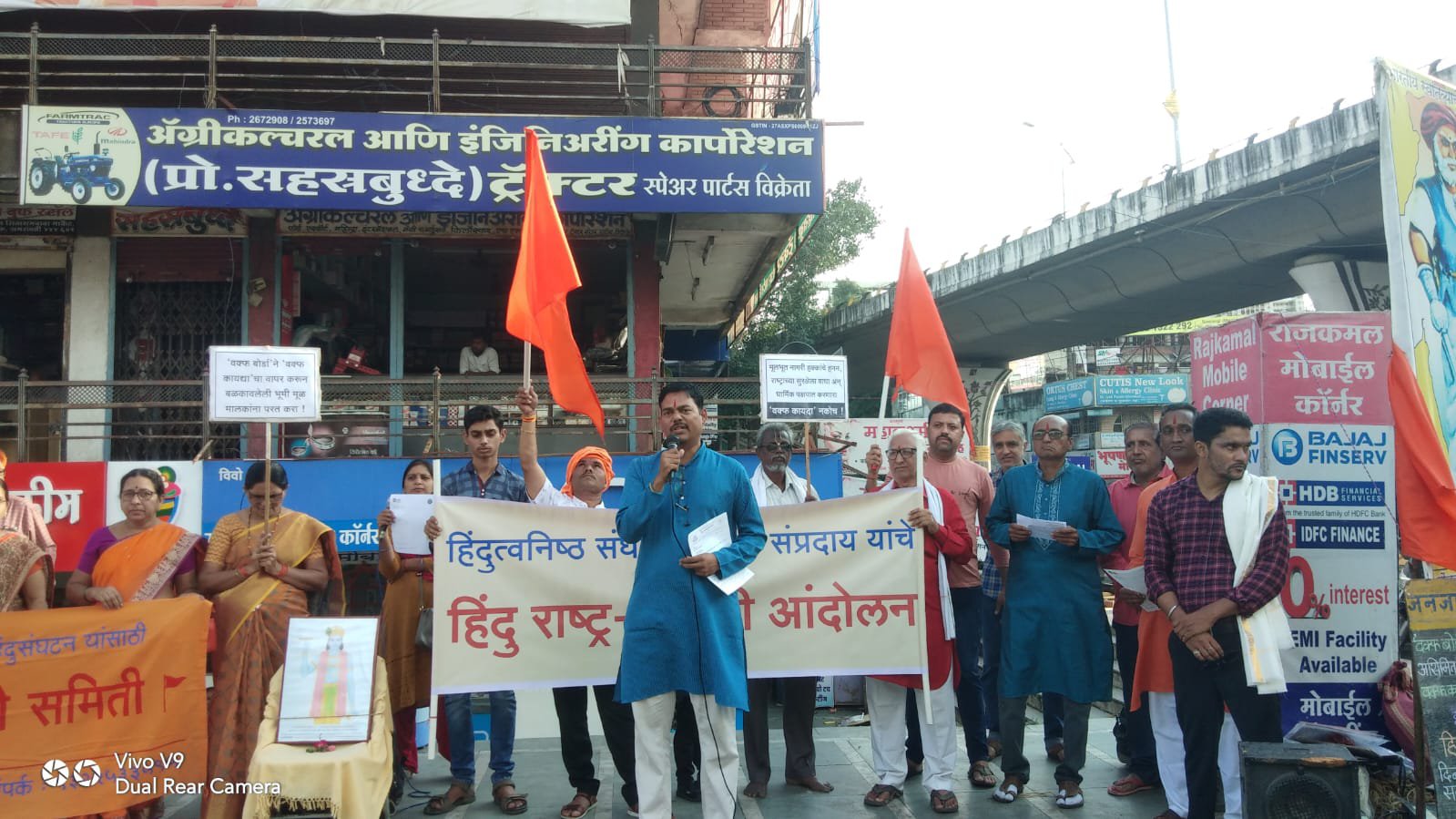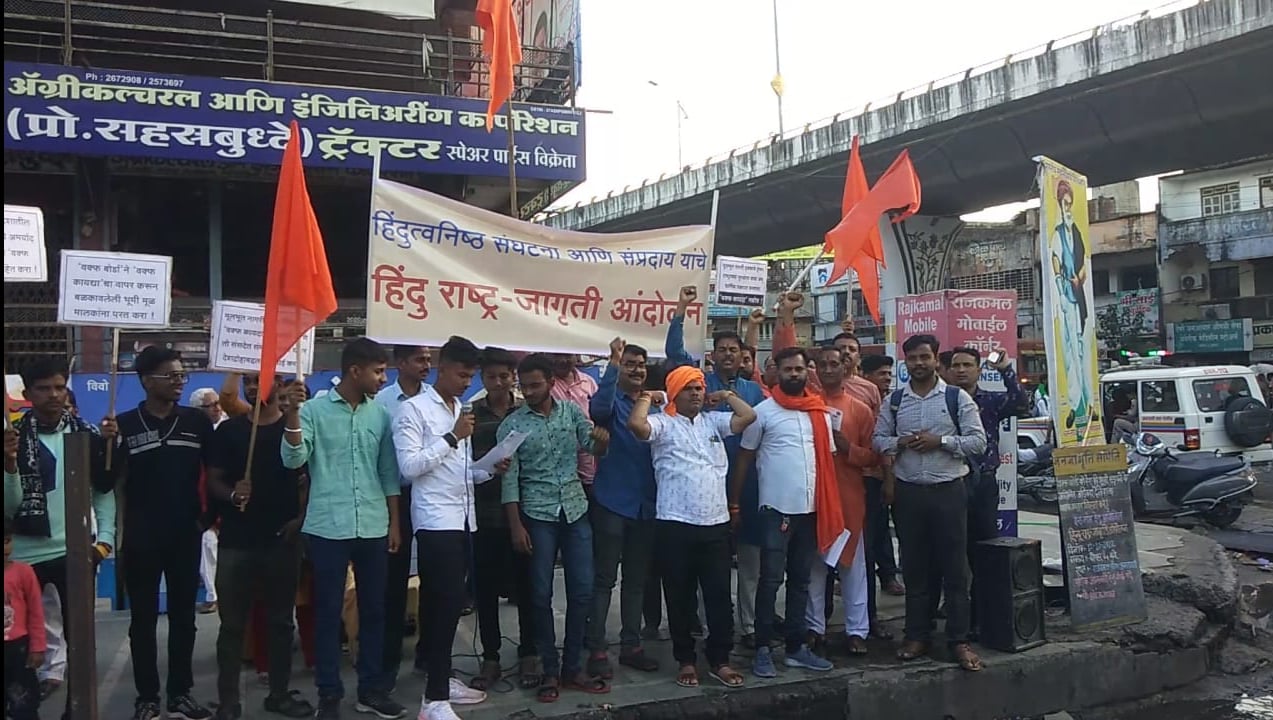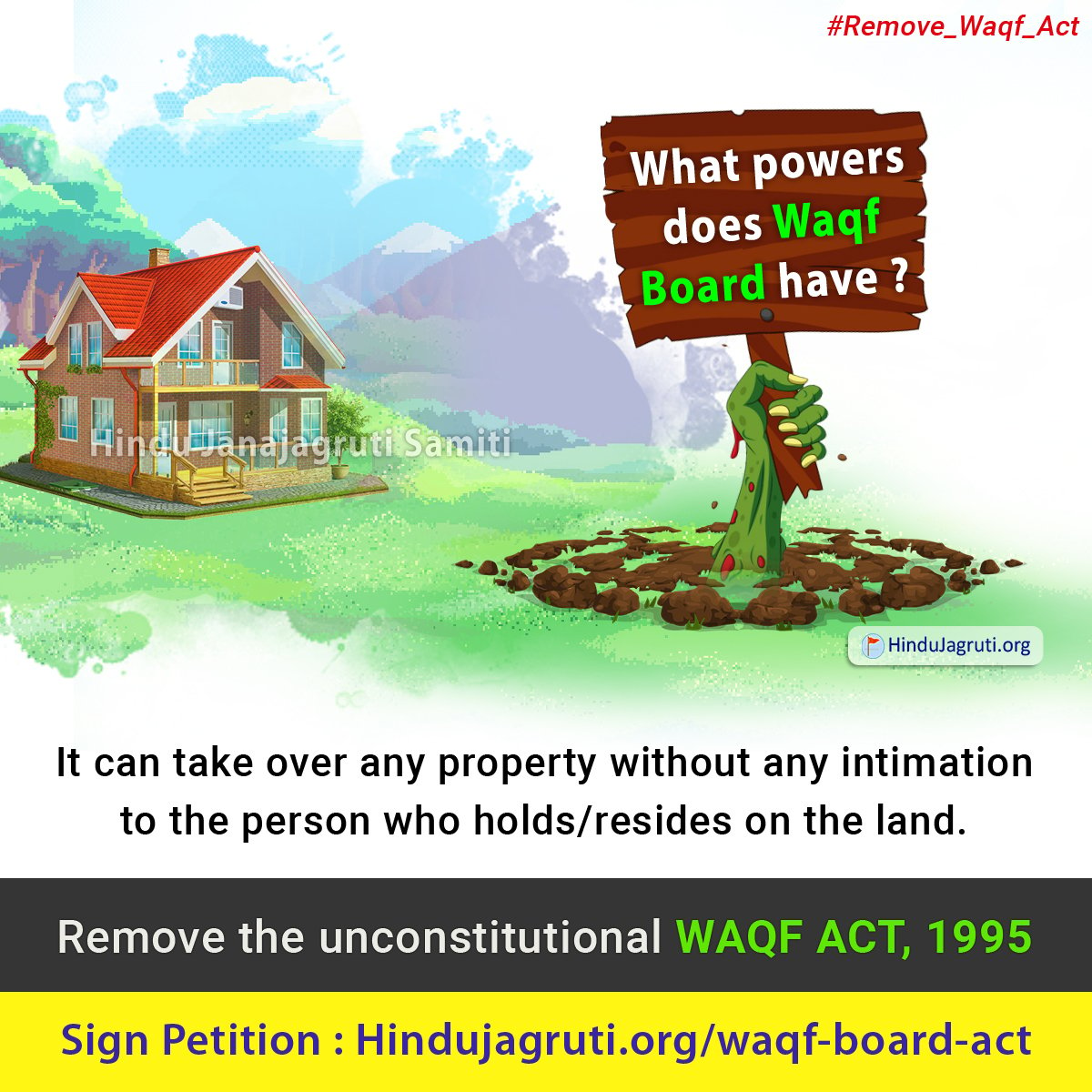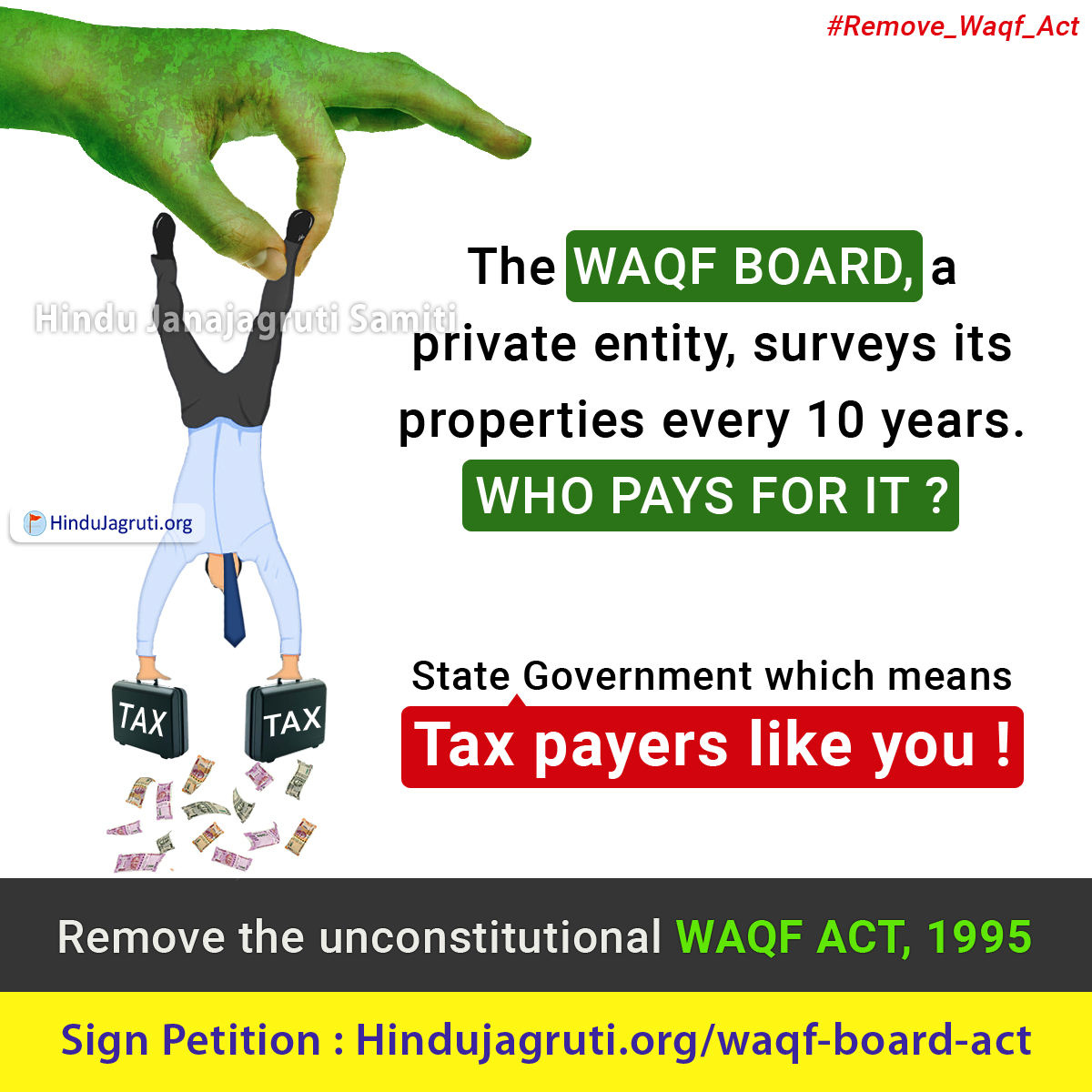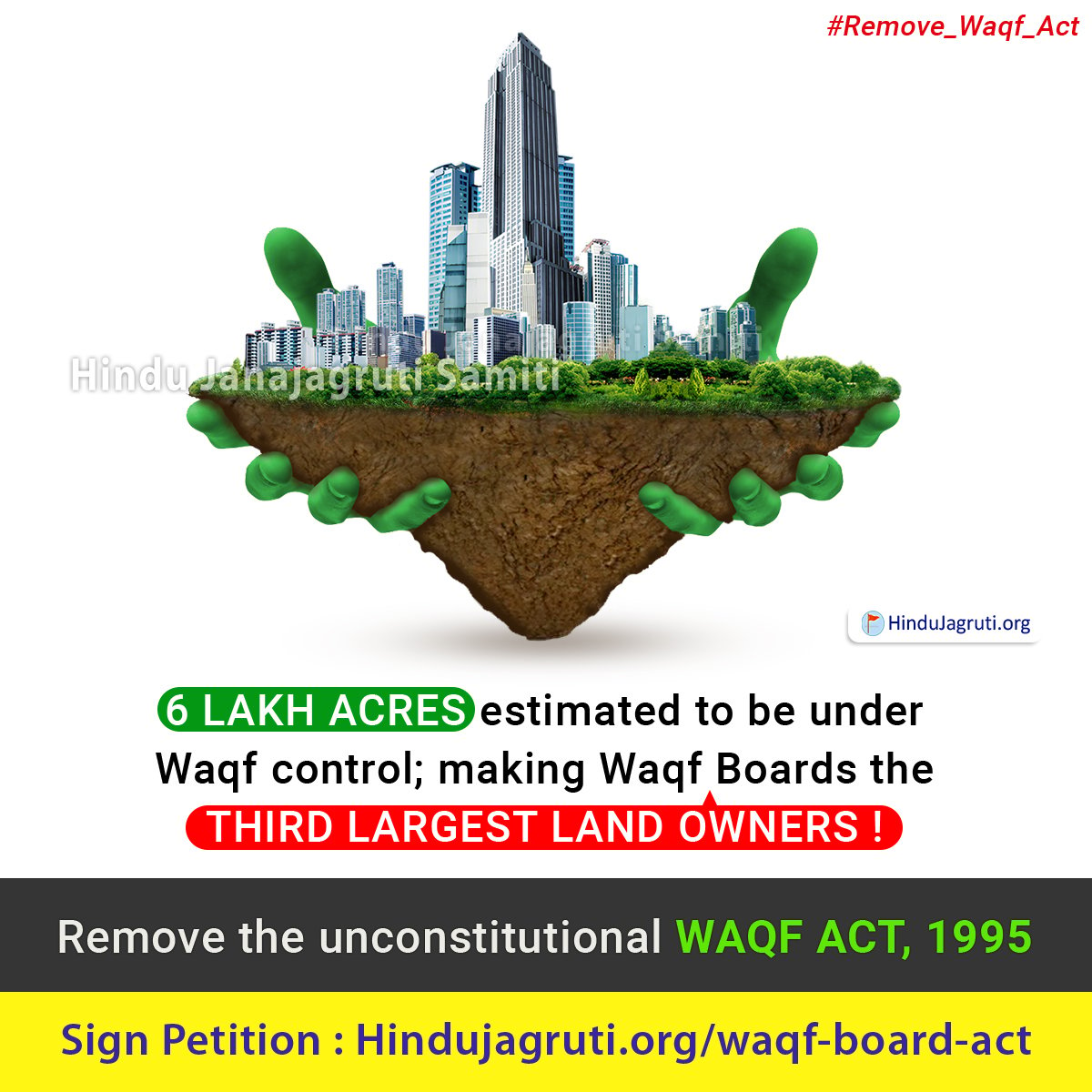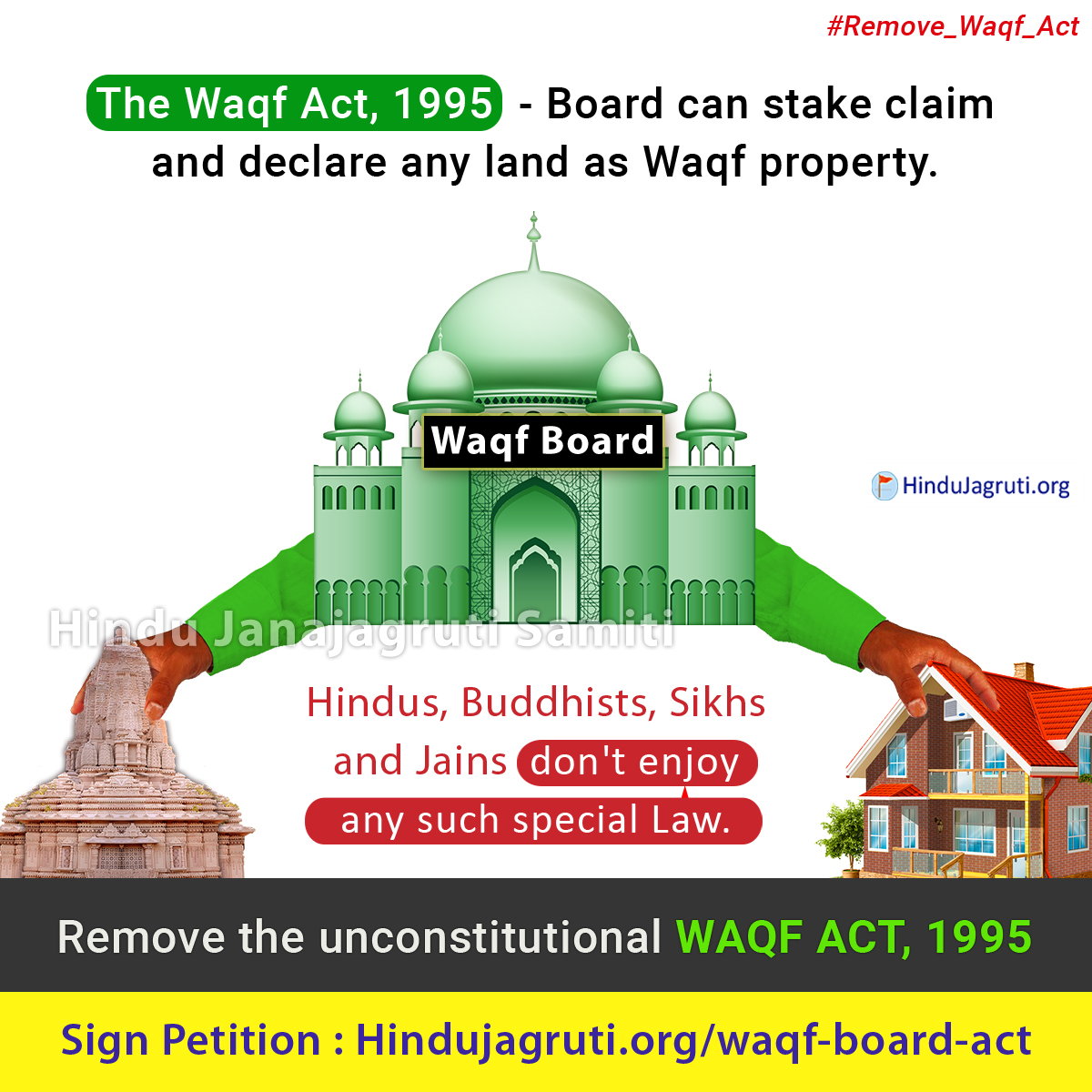The Waqf Act bestows absolute powers on the Waqf board to lay claim on any property. This is why today, the Waqf properties are estimated to cover about 6,00,000 acres across the nation; making them the third largest land owner ! This is nothing but a clandestine takeover of the nation’s resources, unfortunately protected by our own laws ! Indians believe that all Indians are equal before law. We demand equality. So, we demand justice. We demand that the Waqf Act 1995 be repealed immediately.
Union Government invites public suggestions regarding Waqf (Amendment) Bill 2024
Hindu Janajagruti Samiti urges Hindus to send their opinions to the Government.
Act now! Share your demands with the JPC on the Waqf (Amendment) Bill 2024
Hindus should question the existence of the Waqf Act 1995, because
- When the Waqf boards own and control lakhs of acres of land, the government still allots land for cemeteries and madarasas. This should stop!
- The Waqf land is in the control of the Waqf bodies who show no accountability. So the government should take over all the Waqf land.
- The Waqf board has been given judicial powers which no other minority committee has. This should end and they should be answerable to the law of the land.
For more draconian facets of the Waqf Act 1995, read our petition (below) to the concerned authorities!
Send your opinions via email.
Email ID: [email protected]
If you prefer to share your views through mail –
The Union Government has urged the public to send their views on the ‘Waqf (Amendment) Bill 2024’ to the following address. Citizens should send two copies of their written views by post.
Postal Address:
Mr. Jagdambika Pal, Joint Secretary (JM),
Lok Sabha Secretariat, 440, Parliament House,
New Delhi – 110001
Fax Number: 011 – 2301 7709
Sign Petition
Immediately repeal the draconian and unconstitutional ‘The Waqf Act, 1995’
Request you to please send the email with this demand to Hon’ble Prime Minister and Hon’ble Minister for Home Affairs by clicking on the below button. Request you to send a copy of the email to [email protected]
(Note: ‘Send Email’ button will work only on Mobile)
Our Demands
We demand equality. We demand justice. We demand that
1. The Waqf Act be repealed immediately.
2. All the properties held by the Waqf Boards across the country be taken over by the Government.
3. High level committees be set up at the National and State levels to probe every such property so that it can be returned to their rightful heirs.
4. The Waqf board has been given judicial powers which no other minority committee has. This should end and they should be answerable to the law of the land.
Efforts of Hindu Janajagruti Samiti
Draconian aspects of The Waqf Act
1. Waqf is a propert endowment by a believer to be held by a trust for religious or charitable purposes. Going by the actual meaning of the word Waqf, the property is ‘detained’ in the service of Allah. So, the property and its usage are thereby governed my Islamic law.
2. However, the Waqf Act also mandates that the Government undertake a survey of all Waqf properties every 10 years. Who pays for the survey? The Taxpayer! Why should the tax payer (which is the majority community) pay for this?
3. The Waqf Act has the draconian provision wherein the Waqf board can take over any property without any intimation to the person who holds/resides on the land, which is what has happened in Tiruchendurai. The only recourse for the aggrieved person is to approach the Waqf tribunal.
4. The Waqf tribunal, as per section 83 of the act, is governed by Sharia law. How can a non-Muslim be forced to approach a tribunal governed by Islamic law to seek deliverance?
5. Section 85, is even worse. The civil courts have no jurisdiction over such disputes! It is pertinent to note that no other minority (Sikhs, Jains, Parsees..) has been granted such absolute powers!
6. The Waqf Act is not subject to the statute of limitations, which contravenes the Limitation Act of 1963. So one fine day, any Waqf Board can lay claim to any property.
7. This brings us to our final point. The Act bestows absolute powers on the Waqf board to lay claim on any property. This is why today, the Waqf properties are estimated to cover about 6 LAKH ACRES across the nation; and the third largest land owner! This is nothing but clandestine takeover of the nation’s resources, unfortunately protected by our own laws!
What is Waqf Act
What is Waqf
The very literal meaning of Waqf is detention or confinement and prohibition. As per Islam, it is the property that is now available only for religious or charitable purposes, and any other use or sale of the property is prohibited. As per Sharia law, once Waqf is established, and the property is dedicated to Waqf, it remains as Waqf property forever.
Waqf means that the ownership of the property is now taken away from the person making Waqf and transferred and detained by Allah. As per Sharia, this property is now permanently dedicated to Allah, making Waqf irrevocable in nature.
‘Waqif’ is a person who creates a waqf for the beneficiary. As Waqf properties are bestowed upon Allah, in the absence of a physically tangible entity, a ‘mutawalli’ is appointed by the waqif, or by a competent authority, to manage or administer a Waqf.
The Waqf Act 1995
The Waqf Act, 1995 was enacted and implemented on November 22, 1995. This act provides for the power and functions of the Waqf Council, the State Waqf Boards, and the Chief Executive Officer, and also the duties of mutawalli.
This Act also describes the power and restrictions of a Waqf Tribunal that acts in lieu of a civil court under its jurisdiction. The Waqf Tribunals are deemed to be a civil court and required to exercise all the powers and functions exercised by a civil court under the Code of Civil Procedure, 1908. The decision of a Tribunal shall be final and binding on the parties. No suit or legal proceedings shall lie under any civil court which this act requires to be determined by a Tribunal. Thus, making the Waqf Tribunal decisions above any civil court.
Once a Waqf property, always a Waqf property
Since the ownership of the property is transferred to Allah from the waqif in the case of Waqf, and property can not be taken back from Allah, once a property becomes Waqf, it will always stay Waqf.
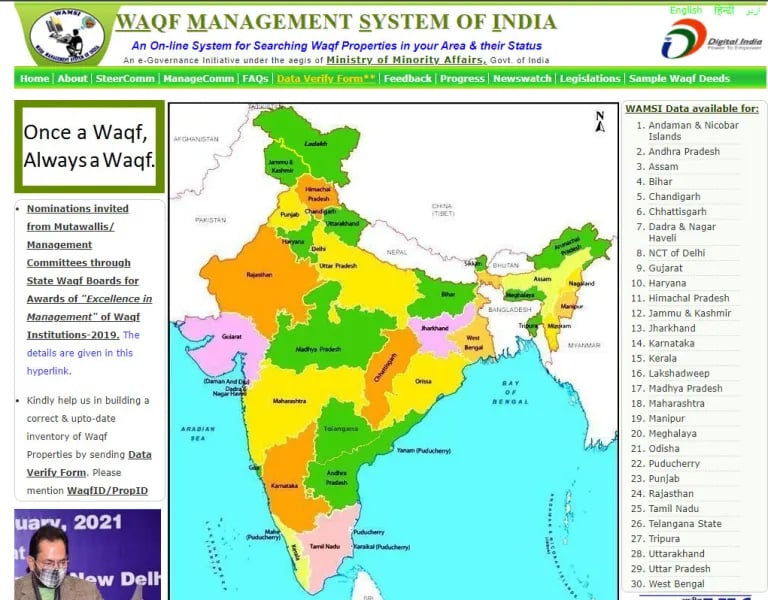
As seen in the case of Bengaluru Eidgah ground, even though there was no title transfer to any Muslim organisation as per the government, Waqf’s claims that it was a Waqf property from the 1850s means that it is now forever a Waqf property.
Recently, the Gujarat Waqf Board had staked claim to the Surat Municipal Corporation building which is now the property of the Waqf because the documents were not updated. As per Waqf, back during the Mughal era, the Surat Municipal Corporation building was a sarai and used during the Hajj travels. The property then belonged to British Empire during British rule. However, when India got independence in 1947, the properties were then shifted to the government of India. However, since the documents were not updated, the SMC building then became Waqf property, and as Waqf Board says, once a Waqf, always a Waqf.
In another bizarre case of staking a claim, Divya Bhaskar had reported that the Waqf Board had written an application to Gujarat High Court staking claim on the ownership of two islands in Bet Dwarka in Devbhoomi Dwarka. A perplexed High Court Judge refused to hear the application and asked the Board to revise its petition wondering how can Waqf stake a claim on land in Krishnanagri.
Another interesting aspect of Waqf is that an apartment in your housing society can any day turn into a mosque without any input from the other members of the society if the owner of that apartment decides to endow it as Waqf. Something similar happened in Shiv Shakti society in Surat where one of the plot owners registered his plot with the Gujarat Waqf Board, making it a holy place for Muslims, and people started offering Namaz there.
How Waqf Boards have been insidiously encroaching upon and occupying various properties
The country today has up to 30 Waqf Boards, which have thus far infringed on many properties and temple lands, with the pattern of operation being consistent in most cases. There are currently 50,000 Waqf properties in the country, covering 6,00,000 acres. These properties have earned 150 crores in revenue thus far and consistent efforts are being made to increase this.
Below are 21 such instances when the Waqf Board in India has mismanaged assets, encroached, illegally disposed of and infringed on various properties in the last few years.
1. Tamil Nadu Waqf Board claims ownership of a Hindu-majority village
2. Uproar over orders to hand over Gurudwara land to Waqf Board in Haryana
3. Surat Municipal Corporation headquarters at Muglisara had been declared waqf property
4. How property in Shiv Shakti society of Mora, Surat, came in Waqf possession
5. Sunni Waqf Board claims Shah Jahan gave them the Taj Mahal, SC demands a transfer deed with his signature
Petitions filed in Court challenging the constitutional validity of Waqf Act 1995
Petition filed by H.H. (Adv.) Hari Shankar Jain, Jitendra Singh and 6 ot\A petition has been filed in the Supreme Court against the Waqf Act, 1995. The petition seeks that the Court should decide that Parliament does not have the power to make Waqf Act 1995 for Waqf and Waqf propertyti as the Parliament cannot frame laws for Trusts, Trust property and religious institutions.
This petition was filed by H.H. (Adv.) Hari Shankar Jain, Jitendra Singh and 6 others. Waqf law gives special status to Waqf propertyti however, the properties of Hindu Trusts, Ashrams and akhadas have not been given such a special status, the petition said. An old decision of the Andhra Pradesh High Court has been cited for this. It said the Waqf Board owns more land than the Indian Railways and the Ministry of Defense. Currently, the Waqf board has 8 lakh acres of land. So far, 6, 59, 877 properties in the country have been declared in the name of Waqf.
The petition alleges that in the last 10 years, the Waqf Board has encroached on the property of others and declared it as its land. The Waqf Board has the power to remove encroachments. There is no time limit for itti however, the property managers, caretakers, mahants, etc. of religious institutions like Hindu Trusts, Ashrams, akhadas, etc. have not been given such rights.
Stating that the Wakf Board is nothing but a religiously spirited group, Advocate Jain pointed out that the sheer basis for the formation of the Board itself is debatable.
Petition filed by Advocate Ashwini Upadhyay
The plea was filed by Advocate Ashwini Upadhyay. Ashwini Upadhyay stated in his plea that the Waqf Act is antithetical to Secularism in India. The PIL stated that the Act is made under the garb of managing waqf properties but there are no similar laws for followers of other religions. The PIL challenged the validity of various provisions under this act. Upadhyay pleaded that the Act is against secularism, unity, and integrity of the nation. He also highlighted that the Waqf is not mentioned anywhere in the Constitution.
In his plea, Ashwini Kumar Upadhyay had said, “If the impugned Act has been made to protect the rights guaranteed under Articles 29-30 then it has to cover all the minorities i.e., followers of Jainism, Buddhism, Sikhism, Judaism, Bahaism, Zoroastrianism, Christianity, and not only Islam.” The petitioner argued that there is no safeguard for Hindus, Jains, Buddhists, Sikhs and other Communities to save their properties from inclusion in the list of Waqf issued by Waqf Boards. Therefore, Hindus, Jains, Buddhists, Sikhs, Bahais, Christians and Zoroastrians are discriminated.
Ashwini Kumar Upadhyay pointed how govt makes payments on Waqf Board but does not collect any revenue, and collects money from Hindu temples but does not spend anything on them. The plea said that the Waqf Board has Muslim MLA, MP, IAS Officer, town planner, advocates and scholars as its members who are paid from the public exchequer, despite the fact the Centre doesn’t collect any money from mosques or dargahs. “On the other hand, States collect around one lakh crores from four lakh temples but there are no similar provisions for Hindus. Thus, the Act offends Article 27,” Upadhyay argued in his petition.
The petition also seeks direction to the Central govt or the Law Commission of India to draft a ‘Uniform Code for Trust-Trustees and Charities-Charitable Institutions’ in spirit of Articles 14 and 15 and publish it for public debate and feedback.
The Delhi High Court issued a notice on 20th April 2022 in a plea challenging the constitutional validity of the Waqf Act 1995.
The relevance of Waqf in a secular country
A special Act for religious properties of only one religion when no such law exists for any other religion smacks of clear discrimination. As a proudly secular country, how do we reconcile with this? In fact, a PIL has been currently filed in the Delhi High Court asking this very question by Advocate Ashwini Kumar Upadhyay. Delhi HC has issued notice to the central government on this plea regarding the constitutional validity of Waqf.
Waqf is not even present in all the Islamic countries with places such as Turkey, Libya, Egypt, Sudan, Lebanon, Syria, Jordan, Tunisia, and Iraq having no Waqfs. However, in India, in a country mired with vote-bank politics, not only are Waqf Boards the largest urban landowners, but they also have an Act protecting them legally.



